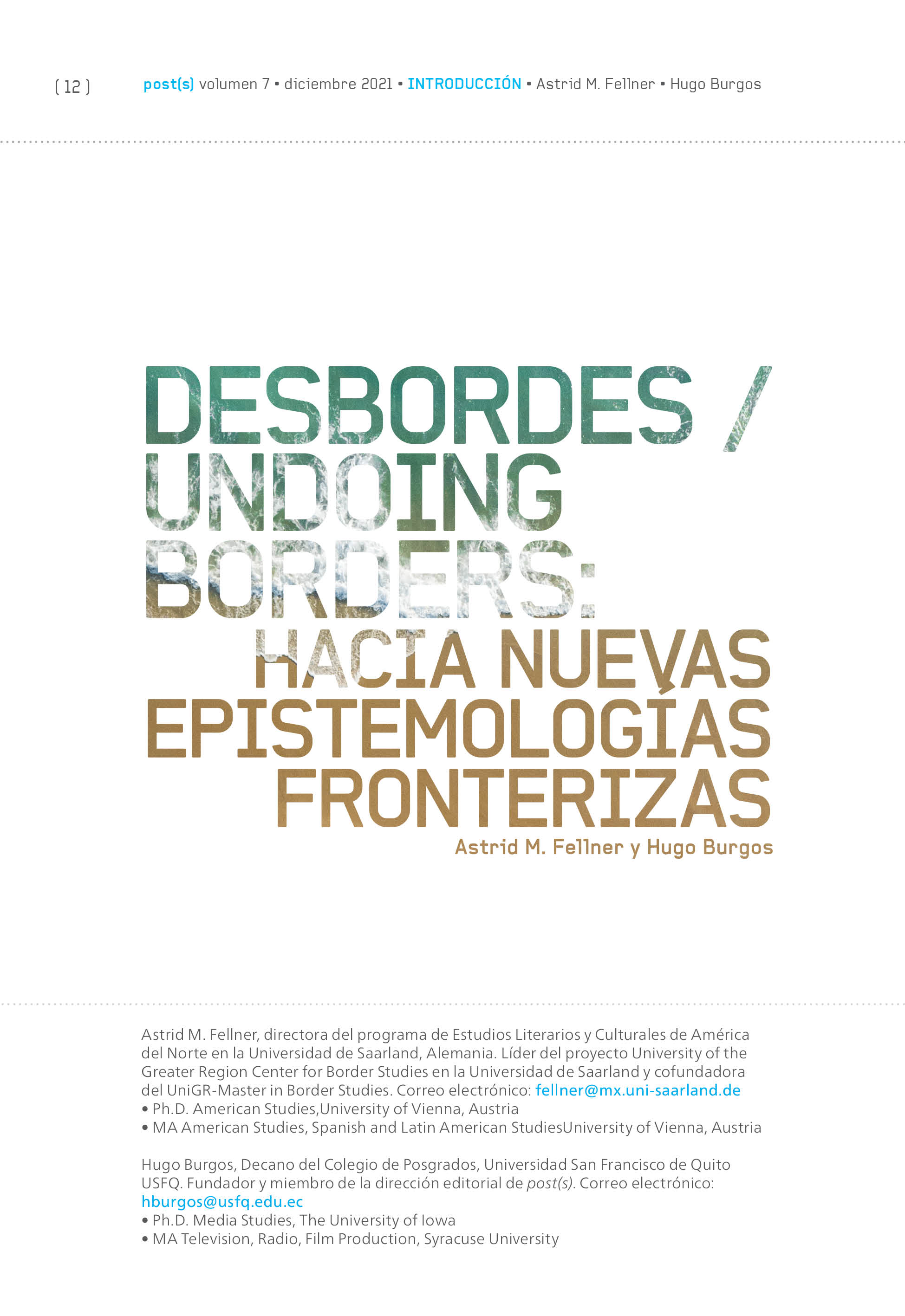
Publicado 2021-12-13
Palabras clave
- fronteras,
- desbordes,
- epistemologías,
- migraciones,
- desplazamientos
Cómo citar
Derechos de autor 2021 Astrid M. Fellner & Hugo Burgos

Esta obra está bajo una licencia internacional Creative Commons Atribución-NoComercial 4.0.
Resumen
Desde que empezó la pandemia de Covid-19, el mundo ha sido testigo de otra fase en la proliferación de fronteras. La discusión sobre los roles complejos de los bordes, las fronteras y los límites se ha vuelto más relevante que nunca. Esta situación nos llama a reconceptualizar los procesos, discursos, prácticas y símbolos a través de los cuales funciona el poder de crear bordes. Las fronteras, está claro, nunca son líneas estáticas, sino productos complejos en múltiples niveles. Incluso más si pensamos en cómo en la era posthumanista, el enfoque antropogénico limítrofe [bordering] ha llegado a sus límites (Konrad 2021), ya que nos enfrentamos con múltiples crisis ambientales y migratorias tanto a nivel local como transnacional. Teniendo en cuenta la importancia de los procesos fronterizos en el siglo XXI, este número de post(s) resalta las nuevas epistemologías fronterizas. Desbordes / Undoing Borders se enfoca en formas innovadoras de deshacer la frontera. Este número proporciona un espacio para investigaciones exploratorias de enfoques creativos de las fronteras, zonas y estados limítrofes, bordes permeables. post(s) 7 se enfoca en interacciones entre las manifestaciones materiales e inmateriales que ocurren en las fronteras y las diversas posibilidades de medios que existen para estudiarlas.
Descargas
Citas
- Anzaldúa, G. (2012). Borderlands/La Frontera: The New Mestiza. Aunt Lupe.
- Appaduari, A. (2003). Modernity at Large. Minnesota University Press.
- Arteaga, A. (2020). Xicancuicatl: Collected Poems. Ed. David Lloyd. Wesleyan University Press.
- Beer, A., y Mackenthun, G. (eds.). (2015). Fugitive Knowledge: The Loss and Preservation of Knowledge in Cultural Contact Zones. Waxmann.
- Benito, J., y Manzanas, A. (2002). Border(lands) and Border Writing: Introductory Essay. En: Literature and Ethnicity in the Cultural Borderlands, 1-22. Rodopi.
- Brambilla, C. (2015). Exploring the Critical Potential of the Borderscapes Concept. Geopolitics 20 (1), 14-34.
- Butler, J. (2004). Undoing Gender. Routledge.
- De Sousa Santos, B. (2014). Epistemologies of the South - Justice against Epistemicide. Paradigm Publishers.
- Fellner, A. M. (2020). Counter-Mapping Corporeal Borderlands: Border Imaginaries in the Americas. Geographien der Grenze. Eds. F. Weber, C. Wille, B. Caesar, J. Hollstegge, 287-300. Springer VS.
- Fellner, A. M. (ed.). (2021). Narratives of Border Crossings: Literary Approaches and Negotiations. Nomos.
- Fellner, A. M., y Susanne Hamscha. (2017). "˜What Goes on in the Coffin"™: Border Knowledges in North American Literature. Critical Epistemologies of Global Politics. Eds. S. Weier y M. Woons, 171-181. E-International Relations Publishing.
- García Canclini, N. (1995). Hybrid Cultures: Strategies for Entering and Leaving Modernity. Traducido por C. L. Chiappari y S. L. López. U of Minnesota P.
- Geertz, C. (1973). The Interpretation of Cultures. Basic Books Inc.
- Johnson, D. E., y Michaelsen, S. (1997). Border Secrets: An Introduction. En Border Theory: The Limits of Cultural
- Politics, 1-39. University of Minnesota Press.
- Konrad, V. (2021). New directions at the post-globalization border. Journal of Borderlands Studies 36 (5), 713-726.
- Laine, J. (2016). The Multiscalar Production of Borders. Geopolitics 21 (3), 465-482.
- Mignolo, W. D. ([2000] 2012). Local Histories/Global Designs: Coloniality, Subaltern Knowledges, and Border Thinking. Princeton University Press.
- Miller, D. (ed.). (2005). Materiality. Duke University Press.
- Parker, N., y Vaughan-Williams, N. (2012). Critical Border Studies: Broadening and Deepening the "˜Lines in the Sand"™ Agenda. Geopolitics 17(4), 727-33.
- Schimanski, J., y Wolfe, S. (2007). Entry-Points. An Introduction. En Border Poetics De-limited. Wehrhahn. Pages?
- Schimanski, J., y Wolfe, S. (2013). The Aesthetics of Borders. Aukrust, Kjerstin (Hg.) Assigning Cultural Values, 235-250. Peter Lang.
- Viteri, M. A. (2014). Desbordes : Translating Racial, Ethnic, Sexual, and Gender Identities Across the Americas. State University of New York.
- Walia, H. (2013). Undoing Border Imperialism. AK Press.
- Wonders, N. A., y Jones, L. C.. (2019). Doing and Undoing Borders: The Multiplication of Citizenship, Citizenship Performances, and Migration as Social Movement. Theoretical Criminology 23 (2), 136-155.
